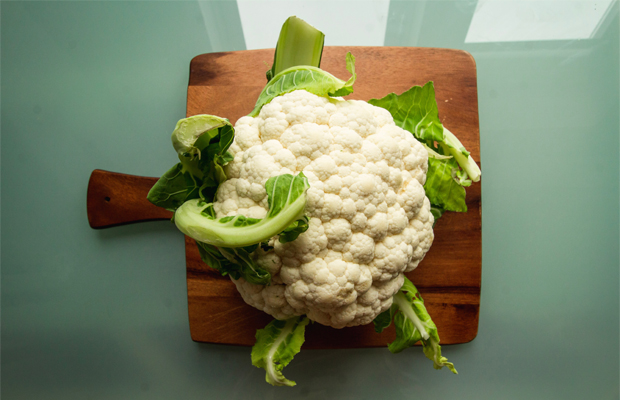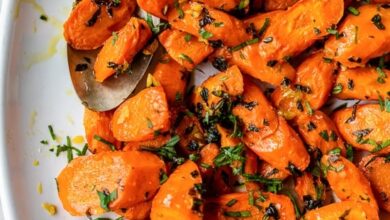9 Benefits of Cauliflower That Make It a Superfood, Says a Nutritionist

In the past few years, one vegetable has been the star of the range, eclipsing all others. And while images of kale or even sweet potatoes may come to mind, the owner of this formidable title is actually Cauliflower. Come on, you know your famous cauliflower tacos, and those delicious cauliflower buffalo wings are a staple in your house so this can't come as a total surprise.
And now that you think about it. If you find yourself eating way too much of it, it's not a bad thing. The cruciferous vegetables, which have long been used interchangeably with broccoli, cabbage, and Brussels sprouts, are one of the most popular vegetables due to their low carbohydrate and low calorie values, as well as their immense versatility. It's hard to name a dish that you can't throw cauliflower into.
CONTINUE READING: Caffeine Effects: "What Happens When I Drink Coffee?"
Whether you prefer white, green, purple, or any of the other types of plants you can find there, cauliflower has proven itself to be a compelling alternative to traditional ingredients and is now regularly used in making anything from rice and pizza crust to macs and cheese and Christmas filling.
But the vegetables aren't just an extremely healthy option for anyone looking to cut carbohydrates and calories. It's also a great source of phytochemicals that are known to reduce the risk of certain diseases, including cancer. Are you ready to dive into all of the amazing cauliflower bennies? Below we list everything you need to know about cauliflower benefits and nutrition, according to a registered dietitian.
What is the diet of cauliflower like?
"Cauliflower is high in nutrients, including fiber, vitamin C, vitamin K, vitamin B6, and folic acid," said Gena Hamshaw, a registered nutritionist and author of The Full Helping blog. "In addition, cauliflower is relatively low in calories and has a high water content."
According to the USDA, a medium-sized head of cauliflower contains an estimated 146 calories, 29 grams of carbohydrates, 1.6 grams of fat, 12 grams of fiber, 11 grams of sugar, 11 grams of protein, and 176 mg of sodium. Of course, these values vary depending on the preparation and the ingredients used, but the diet of the vegetables makes them an appealing addition to almost any diet.
What are the Benefits of Eating Cauliflower?
There are many benefits to consuming cauliflower, from meeting your body's needs for certain nutrients, to the different ways it is prepared. Here we look at nine of the top veggie benefits.
1. It is high in fiber
It's no secret that fiber is a necessary part of any diet, or can be of great help to overall health – and luckily, cauliflower is abundant in it. Because 10 percent of your daily fiber needs are met with just a single cup of cauliflower, the vegetable can lower the risk of various diseases, including heart disease and diabetes. Eating regularly is also a great way to promote digestive and heart health in general, which is what everyone wants, says Hamshaw.
CONTINUE READING: 24 High Fiber Foods That Nutritionists Should Have On Your Plate Every Day
2. It is a good source of choline
"Choline is a nutrient that plays a role in the functioning of the nervous system and metabolism, and getting enough choline can also aid memory function," notes Hamshaw. Many people are deficient in nutrients because relatively few foods contain them, but one cup of cauliflower provides about 11 percent of your daily requirement.
3. It supports immune system health
There's a reason vitamin C has become such a hot topic in recent years because the world has made immunity a priority in the face of widespread diseases. The antioxidant is known for its anti-inflammatory effects and ability to boost immune function, Hamshaw says, and cauliflower is known to be rich in it.
4. It is high in vitamin K
You're probably less familiar with vitamin K than many of its counterparts, but believe us when we say it's just as important. The fat-soluble vitamin plays an essential role in bone metabolism, regulates blood calcium levels and blood clotting, which means that it helps your body heal from any type of injury. And cauliflower contains roughly 20 percent of your recommended daily allowance of vitamin K, so your body will thank you for eating it.
5. It can help you lose weight
With just 25 calories in each cup of cauliflower, the veggies are an obvious choice for anyone looking to lose weight. Not only is it high in fiber, which will slow your digestion and keep you feeling full longer, but it's also very high in water content. With 92 percent of its weight from water, consuming cauliflower can help keep your body hydrated and, when added to a proper diet, weight loss.
6. It can help reduce the risk of cancer
"Cauliflower contains phytonutrients – chemical compounds found in plants – that have been linked to protecting against chronic diseases, including cancer," says Hamshaw. The vegetable is high in glucosinolates and isothiocyanates, two groups of antioxidants that have been shown to reduce cancer and especially protect against breast, colon, lung and prostate cancer.
CONTINUE READING: 15 Crazy Delicious Cauliflower Recipes To Help You Lose Weight
7. It contains some of almost every nutrient you need
It's rare that a single food can meet almost all of your body's nutritional needs, but cauliflower does just that. Aside from the more obvious vitamins B, C, and K, cruciferous vegetables are an excellent source of folic acid, potassium, magnesium, phosphorus, and more, all Minerals You Need to Maintain Overall Health
8. It is a great alternative to grain
Whether you're on a low-carb diet and want to eliminate more grains, or just hope to increase your vegetable consumption, cauliflower can be of great help. With around nine times fewer carbohydrates than rice and tons of vitamins and nutrients, it's a great alternative to traditional grains. You can find cauliflower-based rice and pasta in many grocery stores these days, or you can try recipes like cauliflower pizza, cauliflower porridge, and cauliflower tortillas.
9. It's incredibly versatile
"Additionally, cauliflower is versatile, filling, and useful in a wide variety of recipes, and it's especially useful in plant-based cooking," explains Hamshaw. “You can turn cauliflower into steak, dip, or porridge. It can be baked, roasted whole or mashed into pasta sauce. The possibilities are endless! "You can also eat the vegetables raw or simply roasted, steamed or sautéed, so that the preparation can be as minimal or maximal as you want.
* This article was originally published on Women’s Health US
READ MORE ON: Food news nutrition nutritional advice



